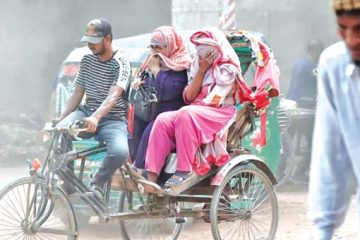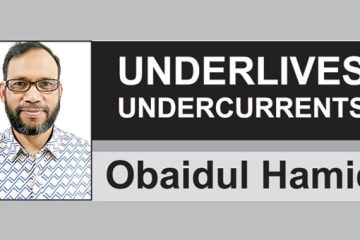Sadiq Ahmed
 Banking is an entirely different ball game. When a licence is given to a bank to manage citizen’s money, the government is taking on a huge responsibility. By granting the licence, it is essentially certifying that it has confidence in the enterprise and trusts that the enterprise will safeguard the citizen’s money it mobilises through deposit taking.
Banking is an entirely different ball game. When a licence is given to a bank to manage citizen’s money, the government is taking on a huge responsibility. By granting the licence, it is essentially certifying that it has confidence in the enterprise and trusts that the enterprise will safeguard the citizen’s money it mobilises through deposit taking.
In banking, safety is of paramount importance; returns are relatively less significant. Ask citizens whether they prefer a bank that gives 20 percent return but a large probability of failure to a bank that gives 10 percent return but has 100 percent safety standards. Most citizens will prefer the second option. So the issue of granting a banking licence is universally regarded as a major responsibility that cannot be taken lightly.
A review of international experience suggests that prudent banking regulations including a sound and rigorous licensing procedure are essential to health of the financial system. The outcome of the tax regulatory framework can be devastating, as graphically illustrated by the global financial crisis that has severely affected the industrial countries including the world’s largest economy. The US is still on the recovery path after 3 years of intense pain caused by turmoil in the financial sector. Developing countries including Bangladesh need to pay serious attention to this experience in designing their own emerging financial sector. The role of proper prudential regulations and the capacity of the regulator to monitor and implement these regulations are of fundamental importance in the design of a healthy financial system.
Bangladesh’s experience with promoting the financial sector is mixed. It has done well in the banking sector but rather poorly in developing the stock market. In banking, a series of reforms starting in early 1980s but gathering momentum in the 2000s has paid off handsomely in terms of most indicators of banking performance. Broad money (M2) to GDP ratio, which is often used as an indicator of the depth of the financial sector, has risen from 12 percent in 1980 to 53 percent in 2010; bank credit as a share of GDP has grown from 14 percent to 49 percent over the same period; and the share of private credit to total credit has similarly expanded from 36 percent to 80 percent.
The quality and stability of the banking sector has improved as reflected by the sharp decline in the share of non-performing loans (NPLs) from a high of 41 percent in 1999 to only 8.7 percent in 2010. Improvements were also made in meeting the capital adequacy requirement under Basel I standards although the progress falls short under Basel II guidelines. The profitability of banks measured against a rate of return on assets and equity has also shown substantial progress, especially in the private sector.
The coverage of the banking sector also compares favourably with neighbouring countries, even though Bangladesh is a significantly smaller economy. The number of banks has grown from 17 in 1980 to 47 in 2010 and the number of branches expanded from 4067 to 7700 over the same period. There are 53 bank branches per 1000 square kilometres in Bangladesh as compared to 10 in Pakistan and 24 in India. There is one bank branch for every 20,000 people in Bangladesh as compared to 20,340 people per branch in Pakistan and 14,485 people in India.
The three main factors that contributed to this improvement are greater competition, better regulations and improved supervision. The opening up of the banking sector to private enterprise was perhaps the most dominant factor. This changed the character of the banking industry as competition amongst private banks and between private and public banks caused a massive increase in financial resource mobilisation, introduction of new financial products and substantially better service to customers. While still catching up with international standards, intense competition in retail banking has nevertheless caused a huge improvement in banking services not only in terms of faster turn-around time for transactions but also in terms of access to modern banking facilities, such as ATMs, e-banking, credit/debit cards, and wire transfers.
As a result of this competition the share of private banks in total assets has grown from 42 percent in 2001 to 65 percent in 2010; commensurately, its share of total deposit has expanded from 43 percent to 66 percent over the same period. Much of the improvement in NPLs also happened due to the rising share and much better portfolio quality of the private banks. Within private banks, foreign banks performed better in terms of NPLs. Furthermore, foreign banks have met or surpassed the Basel II risk weighted capital guidelines, making them the safest banks in the industry.
Banking regulations have been progressively tightened. Full implementation of the Basel II guidelines will be of further significance in this regard. Similarly, progress has been made in improving the supervision capacity of the regulator, Bangladesh Bank (BB).
Notwithstanding this progress, a number of concerns remain in the banking sector. First, there are sharp differences in the performance of banks, especially between private and public banks. For example, the NPL of private banks is only 3.7 percent; it is 20.5 percent for public commercial banks and 24.6 percent for public specialised development banks.
This high share of infected portfolio of the public banks is a serious problem. Even if one were to ignore the potential threat to banking stability because of implicit government bailout, it poses a major fiscal risk. Second, the banking sector as a whole is not compliant with the capital adequacy requirement of Basel II. As of June 2010, only foreign commercial banks met or exceeded this requirement. Private commercial banks on average had a risk weighted capital asset ratio of 8.69 percent, lower than the required 10 percent under Basel II. Public commercial banks had a risk weighted capital asset ratio of only 5.67 percent, while it was negative for public specialised development banks.
Third, there are important issues relating to the corporate governance of banks. Due to political connections and influences, some private banks are able to bypass standards relating to fit and proper criteria for the bank board and management.
Fourth, public banks are not within the purview of the supervision of BB. As such, compliance with prudential regulations is weak.
Finally, not withstanding progress, the capacity of BB in supervising the large number of banks is constrained. As a result, banks are often able to bypass prudential standards for liquidity ratios, compliance with credit/deposit ratios, exposure to stock markets, compliance with capital adequacy and accounting standards.
In this environment of an unfinished banking reform agenda and significant downside risk, the issue of new banking licences needs to be handled with care. This must not be approached entirely on political grounds. Securing the safety of the citizen’s money must take precedence over any political gains that might be associated with the granting of new bank licences. There are at least three sets of issues that need serious review and discussion. The first challenge is to establish the case for new banks. The second concerns the need to examine the adequacy of the criteria for licensing. The third concern for evaluation is the adequacy of prudential standards and supervision capacity of BB. Let’s review each of these issues in some detail.
Regarding the case for new banks, it is tempting to argue that Bangladesh is under-served by banking services and new banks will improve access while also reduce costs and improve services through competition. If these objectives could be secured, then the case for new bank licences is indeed strong. A closer look however suggests serious pitfalls. While Bangladesh is under-served by the banking services, this is mainly true of rural areas. The failure to adequately serve the rural areas through traditional banking is largely due to the high cost and low profitability of these operations.
This is the main reason for growth of the micro-finance enterprises as an alternative rural banking service delivery institution. So giving new licences to traditional banks will not likely result in better access; they will simply crowd out the existing banks and compete for the same market share in the urban areas. While in principle, efficient banks will edge out the inefficient banks, the turmoil it may cause to the banking industry and the potential downside risk of bank failures will likely weigh out the potential benefits.
A better way of improving access is to change the criteria for new branches from 1 rural branch for every 4 urban branches to 2 rural branches for every 3 urban branches. The cross subsidisation of rural branches through urban branches might still be profitable for existing banks.
Concerning the adequacy of the criteria for licensing, Bangladesh might want to emulate the example of India. The Indian government is thinking of granting new licences to banks. To ensure transparency and facilitate debate and discussion, the government asked the Reserve Bank to do a full review of international experience with bank licensing and put the analysis on its website. Feedback through this process will then shape the government’s policy for revising the bank licensing criteria as appropriate.
The main issues underlying licensing are common to most countries and relate to the following — minimum capital participation of sponsors; minimum-maximum single source share-holding norms; fit and proper tests; avoiding conflict of interest of the sponsor; and adequacy of the business plan.
Good practice lessons of international experiences suggest the minimum capital participation must be large enough to ensure strong stakeholder interest in the enterprise and avoid jeopardising depositors’ interests. While regulators in Europe, Japan and USA are somewhat liberal in their minimum capital requirements, more conservative regulators in Malaysia, Indonesia, Kuwait and Singapore require paid up capital exceeding $250 million. Singapore, for example, sets the toughest standard by requiring a whopping $1.l billion. In India it is presently at Rs 300 crore ($71 million); the proposal is to raise it to between Rs 500 and Rs 1000 crore ($122-$ 244 million).
The minimum-maximum single source share holding norms range from 5 percent to 50 percent, with most countries at the lower range for maximum holding by any single entity. The generally preferred objective is to avoid concentration of bank ownership. Most countries prevent industrial or other business houses from having management influence on banks to avoid a conflict of interest. This is done either by outright restrictions on ownership or by limiting share-holding such that it prevents management control.
Most regulators follow fairly stringent fit and proper test in terms of ensuring the quality of the bank boards and management. Finally, most regulators require a fairly detailed and coherent medium-term business strategy and hold the sponsors accountable for its implementation with little or no diversion from the strategy except through prior permission from the regulator.
It is imperative that BB in its capacity as the regulator must define the entry criteria in as much detail and clarity as possible. This set of criteria must be put on its website for public review and debate. The criteria must ensure adequate standards of protection of depositor interests, especially by rethinking the adequacy of the present minimum paid up capital requirement of Tk 400 crore ($53 million) and whether this should be increased to Tk 600 crore ($80 million). It must define the fit and proper criteria adequately and ensure its full compliance by all banks. It must also require all enterprises seeking new banking licences to specify a detailed 3-year business plan with implementation benchmarks that become a part of the agreement. The government must refrain from intervening in implementation of the agreed criteria.
The supervisory capacity of BB is limited by a lack of autonomy to implement prudential regulations as well as its inability to hire competent staff owing to tight control of the government on its compensation package. The already constrained supervision capacity will be further stretched by the issuing of new licences. The government must weigh this factor in deciding when a good time to allow new banks is. Political interference in the implementation of BB’s work including in the conduct of monetary policy as well as supervision of banks is well known. The government may want to rethink the degree of autonomy it wishes to convey to its central bank. A strong and autonomous central bank will likely strengthen this institution and lead to better performance.
The government should also rethink the strategy for supervision of public banks. The public banks that perform weakly with large infected portfolios are a serious threat to the soundness of the banking sector. In addition to efforts to improving their performance, these banks must be brought under BB’s regulatory supervision and must be required to comply with all prudential norms.
(Article originally published on The Daily Star)
The writer is vice chairman of Policy Research Institute of Bangladesh. He can be reached at sahmed1952@live.com.







